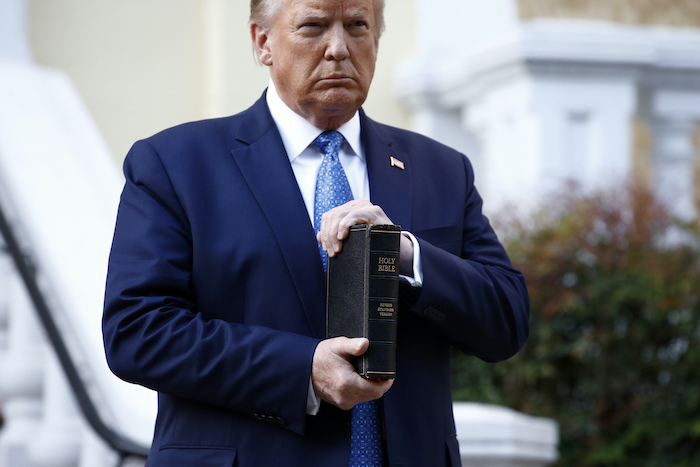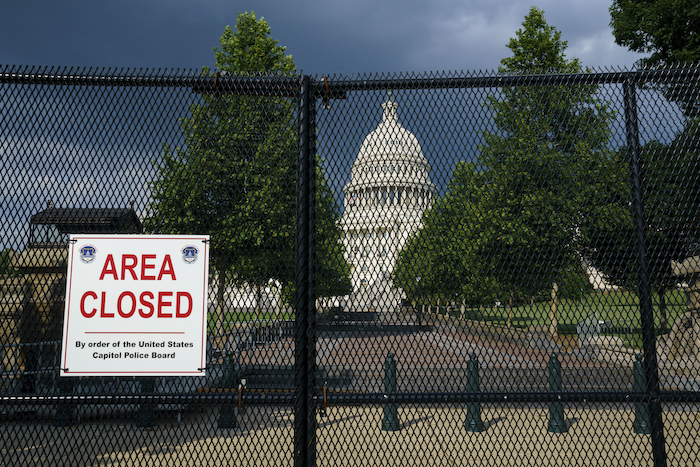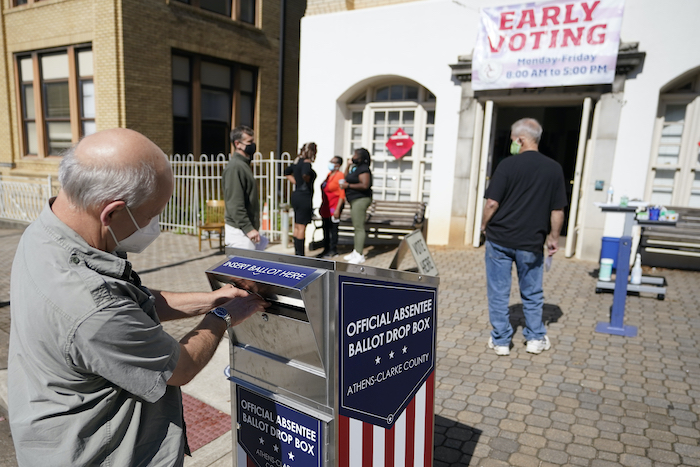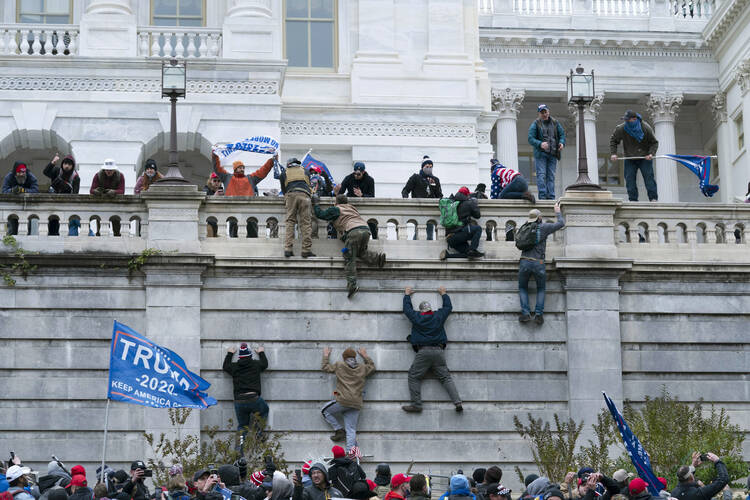On June 1, a group of 100 history and political science scholars issued a warning about “the recent deterioration of U.S. elections and liberal democracy” and concluded, “History will judge what we do at this moment.” The warning did not come out of the blue. The strength of democratic political institutions in the United States has come under increasing scrutiny over the past six years—not coincidentally, dating to Donald Trump’s announcement on June 16, 2015, that he was running for president. Mr. Trump’s capture of the Republican Party, followed by his four-year presidency, increased concerns about deepening political polarization, a growing distrust of the news media and a breakdown in civil discourse that has spread across the ideological spectrum. Then, this year brought the unprecedented insurrection at the U.S. Capitol by followers of a president who refused to accept his loss in a fair election.
America has been covering the challenges to the U.S. political system that have so alarmed historians and citizens over the last six years. Here are some of our contributors’ thoughts on what the nation is facing and how it can right its course.
The big picture for U.S. democracy
“Donald Trump is a unique threat to the Constitution,” the editors of America, Sept. 16, 2020:
The administration of Donald J. Trump has undermined the constitutional order to a degree unprecedented in modern American history, which prompts the editors of this review to register this unprecedented warning. The principal concern here is not with Mr. Trump’s positions on various public policies, some of which are right and some of which are wrong, but with the president’s disregard for the system of laws and customs that establish the necessary conditions for debate, decision-making and public accountability in this republic.
“Trump deserved to be impeached—but our nation’s problems run deeper than one man,” Matt Malone, S.J., Jan. 13, 2021:
...the sense of peace or stability created by the purge of the scapegoat...does not last. Soon divisions within the community re-emerge, and the cycle of escalating rivalries begins anew…. Mr. Trump’s departure from Washington will not heal the country in the ways we tend to think it will. The cycle of rivalry and violence will likely recur.
“American democracy is in crisis. Do we have what it takes to save it?,” Drew Christiansen, S.J., Dec. 10, 2020:
Franklin and the other framers, schooled in ancient history, were apprehensive of popular democracy, and they designed the Constitution with a variety of checks against the assertion of popular power. A more favorable view of democracy came with the electoral reforms of the Progressive Era (1890s-1920s)—primary elections, referenda, recall, the direct election of senators and women’s suffrage—that rolled back the constraints of the republican model for a more democratic one. Two World Wars fought “in defense of democracy” fostered in the public mind the conviction that the United States of America is a democracy….
Whether a republic or a democracy, the question is, will the American public continue to support it?
“What would Jefferson say about today’s America?”, James T. Keane, Jan. 22, 2017:
...what perils would Jefferson and Franklin warn us against? After all, democracies do die, and republics can rather abruptly transform into empires. The Athenian democracy was overthrown twice during Socrates’ lifetime alone. The Roman Republic collapsed at its most prosperous hour, its senators reduced with astonishing speed to ceremonial figures beholden to an Emperor. As Jefferson and Franklin both knew, to imagine ourselves heirs to Republican Rome means we also must not pretend our republic is immortal just because it is exceptional.
Division and incivility
“Dante, Trump and the moral cowardice of the G.O.P.,” Charles Sykes, July 21, 2019:
Democracy is fragile because we are all an odd mix of prejudices, vices, virtues, bigotries and aspirations. We can be demons or angels. That’s why moral leadership matters; society can go either way….
This is why what Mr. Trump is doing is so dangerous and destructive. Abraham Lincoln appealed to our “better angels.” The president has given us permission to indulge our fouler impulses.

“Three steps for more civil political debate in the Trump era,” Daniel Allott, Aug. 24, 2018:
People are purging their friend groups of anyone outside their political tribe. Trump administration officials are being refused service or harassed at restaurants. And I have noticed more opinion pieces like a recent one in the Jewish magazine The Forward titled, “No, we don’t have to be friends with Trump supporters,” whose author argued, “When they go low, stomp them on the head.”
“We’re all responsible for the toxic discourse that lets Marjorie Taylor Greene and Father Altman thrive,” David Albertson and Jason Blakely, June 8, 2021:
An astounding amount of public discourse today has become an exercise in what might be termed “political theodicy.” Theodicy is a venerable theological exercise that attempts to maintain the absolute goodness of God in light of the world’s various evils…. Political theodicy borrows this rationale but misuses it in the service of something other than God. It locates all of the world’s evils outside one’s own party, movement or leader by permanently attributing them to one’s opponents—a political if not infernal damnation.
“Understanding Trump supporters in an age of winner-take-all politics,” Holly Taylor Coolman, Oct. 15, 2019:
In the long term, what we need most is a culture more characterized by empathy, by peacemaking and by mercy. This is, after all, an indispensable form of living the Gospel message. To speak more practically, the U.S. political system only works when we are able to recognize underlying commonalities with political opponents and forge creative compromises for the sake of the common good.
“Is our gun culture compatible with democracy and freedom?” (review of Do Guns Make Us Free?, by Firmin DeBrabander), Zac Davis, June 15, 2016:
Democracy demands that its citizens hold “a willingness to work with others, an interest in others and a modicum of trust that others might be fruitful partners—that the world outside is worth and liable of change.” The N.R.A. and the loudest voices of the gun rights movement instead peddle a vision of a damned and fallen world, where only the armed individual can protect what is theirs.
“Women hold the keys to making Washington work again,” Cokie Roberts, Jan. 23, 2017:
When the government shut down a few years back, it was women who started the conversations to break the deadlock. Practical-minded female politicians understood that the impasse affected real people. Their reaction: “Oh, for heaven’s sake!”
The fall of the news media
“Alternative facts and the coming constitutional crisis,” Matt Malone, S.J., Jan. 26, 2017:
Jefferson believed that the pursuit of truth, especially those empirical facts that are the first instance of truth and the foundation of good journalism, is the surest guard against tyranny, so much so that he once said that if he had to choose between newspapers without a government, or a government without newspapers, he preferred the former.
Yet many Americans now find such sentiments quaint or naïve. In our contemporary politics, facts are not stubborn but elastic things: You have your facts, I have my “alternative facts,” statements not subject to painstaking empirical verification, but simple ideological confirmation.
“A road trip through the swing states (before the coronavirus hit),” John W. Miller, April 3, 2020:
Like other politically conservative Catholics I met on the trip, focus group members… said they mainly got their information from Fox News. Few read a newspaper anymore….
Maybe as a result of this breakdown in how people get their news, some were slow to heed the alarm over Covid-19. “The virus, I believe, is being blown out of proportion,” Phil Remke, the former mayor of Moundsville, a West Virginia town down the river, texted me on March 15. “I believe the media is causing the panic.”
“Western societies can’t ignore the ‘crisis of trust’ we’re experiencing,” Warren von Eschenbach, Feb. 20, 2018:
Understanding trust as a public virtue explains why the increasing prevalence of dubious attacks on mainstream media for promulgating “fake news” is worrying, especially when espoused by political leaders. These charges contribute to the crisis of trust by undermining the authority and trustworthiness of social institutions, such as free and independent news outlets, necessary for a well-functioning democracy. The problem goes deeper when coupled with instances of actual “fake news” disseminated with the intent to mislead and confuse citizens for partisan gains.
“Why journalists need to resist the label of ‘the opposition’,” Eileen Markey, March 21, 2017:
These attacks by the Trump administration come as the press is severely weakened by decades of newspaper and magazine closings, a desperate drive to flatter and entertain fickle internet-addled readers, and a dive into punditry, which is cheap to produce but useless for the acquisition of knowledge. Each of these developments has been bad for democracy and has eroded the nation’s ability to engage in critical discourse about public life.
The rise of social media
“We’re all at risk of being radicalized by Facebook. Do these 3 things to resist (if you don’t want to delete your account),” Justine Limpitlaw, May 18, 2021:
The social media platform is designed to push you to the extremes of your inclinations by feeding you with a barrage of content that you find outrageous and feel the ardent need to respond to, and by the echo chamber that removes the doubt that you could be wrong—that there could be other quite reasonable ways of seeing a situation.
“I cover politics for NPR. We can do better than this,” Scott Detrow, Sept. 6, 2017:
Social media is increasingly the prime battleground for partisans to fight it out in increasingly personal attacks. This trend was never more clear to me than this June, in the hours after a gunman assaulted Republican lawmakers on a northern Virginia baseball field. Standing in the Capitol hallways, I could see the shock, confusion and fear on the faces of men who earlier that day had to dive for cover from the shots of an assault rifle.
Then, in between interviews, I would check my phone and see Twitter filled with takes that boiled down to this: Because the men on the field opposed gun control or were at the time pushing to scale back Medicaid and the Affordable Care Act, somehow the shooting was poetic justice.
Apocalyptic thinking

“A case against constant provocation,” Nathan Schneider, Aug. 29, 2017:
Provocation comes at us all the time now. The trouble with having a reality-television star as president of the United States is that every few days, another shock arrives through the news, upending political norms that seemed like they were real until this president shattered them with some new spectacle of rawness and realness. The shocks are fully predictable and yet not quite imaginable until they happen.
“Why liberals should stop calling Trump ‘unfit’ to be president,” Margot Patterson, March 14, 2017:
In pressing their claim that Mr. Trump is uniquely unqualified to be president, liberals come off as sore losers and worse. If a wide streak of paranoia seemed to run through the conservative rants of previous years—“Obama is going to take our guns away”—more than a hint of hysteria characterizes many of the current liberal tirades about the president. Either the death of democracy is at hand or the Russians are coming, the Russians are coming. Sometimes the two arguments converge to suggest that the election has been stolen. From there, it is not a far jump to say its results could be disregarded.
“Politeness, the forgotten virtue,” John Conley, S.J., April 19, 2017:
...the popular media cannot get enough philosophical commentary on the moral issues that crash into the political order. Was President Donald J. Trump’s strike on the Syrian airbase justified? What about George W. Bush’s policy on stem cell research?.... One can easily have the impression that every moral decision is an ambiguous, terrifying choice between competing goods right out of a tragedy of Corneille. But everyday life is full of gentler, more obvious choices that determine the moral texture of our social lives together.
Turning away from the truth
“Does the truth matter? This is no longer a theoretical question,” Charles Sykes, June 5, 2017:
At one time, really not that long ago, our culture, institutions and traditions provided guardrails for our politics, limiting the impact of the most dishonest or most reckless voices. But in the age of social media, those rails are gone, along with the gatekeepers of fact. The result is that we now find ourselves awash in fabulism, fake news and outright lies, some of them coming from the White House itself. Indeed, even as we wrestle with our political divisions, one of the most consequential questions we now face is whether truth matters anymore. This is no longer a theoretical question for postmodern academics. It is increasingly an existential question for our democracy.
“Liz Cheney’s ouster from Republican leadership is bigger than politics. It’s a fundamental attack on truth,” Bill McCormick, S.J., May 17, 2021:
The ouster of Ms. Cheney is an affront to the truth at multiple levels. First, Mr. Biden did not steal the 2020 presidential election…. Second, most if not all Republican elites know that he did not steal the election, but are lying because they feel trapped by their own inability to craft a post-Trump Republican Party, and because they have been so successful at deluding much of their base. Most disturbingly, the G.O.P. is clearly spreading falsehoods to justify reserving to itself the option to reverse any future election result it does not like.
The electoral system
“It’s too difficult for ‘ordinary’ people to run for office. The For the People Act can change that,” Matt Keller, March 1, 2021:
...because of the Supreme Court’s disastrous Citizens United decision in 2010, the system is again awash in a sea of special interest money—known as “dark money” because it is hidden from view and used in a way that promotes the interests of the few at the expense of the many. The system continues to make it hard for people of ordinary means to run for federal office, and so, despite some recent gains made by women and people of color, Congress is far from reflective of the country as a whole.

“It’s time to rethink the Electoral College,” John D. Feerick, May 8, 2020:
Previous attempts to end the Electoral College have failed because reformers have differed on how to change the system and because opponents have argued that the Electoral College has both provided stability and ensured representation for all states. But does fundamental fairness require that every vote be equal in a presidential election because the president is elected to represent all of the United States? This one-person, one-vote principle prevails in all other U.S. elections…
“Many Catholics are disillusioned with both the Republicans and Democrats. Could a third party ever happen?”, Bill McCormick, S.J., May 1, 2020:
Sometime between the 1960s and the ’90s, the parties sorted themselves, especially in the South, such that now almost all liberals are Democrats and almost all conservatives are Republicans…. There are not simply two parties in the United States, but a duopoly, a durable framework in which two parties have successfully excluded competitors.
“Georgia’s new voting law is an affront to Catholic social teaching,” Kathleen Bonnette, April 20, 2021:
...after reviewing the 2020 election, in which just shy of five million Georgia voters cast ballots, the state’s Election Board announced that it was referring only 35 cases of election-law violations for prosecution (most of them involving individual noncitizens or former prisoners who tried to vote and may not have been aware they were ineligible). The Election Integrity Act seeks to address these 35 cases by restructuring Georgia’s election process in a way that may undermine the ability of tens of thousands of eligible voters to cast their ballots. What does it say about the United States that we seem more eager to restrict voter participation through such disproportionate means than to regulate gun ownership or mitigate harms to the environment, despite the clear evidence for the life-saving implications of the latter measures?
The imperial presidency
“How to survive Trump: End the cult of the presidency,” Nathan Schneider, May 30, 2018:
...with populist, perpetually viral, personality-driven regimes taking power in country after country, the long-held assumption that liberal democracy is the eventual destination of historical progress can no longer be taken for granted….
The presidency has become a cult, like that of a medieval patron saint, to which we are expected to constantly direct our attention. Other forms of civic duty have been supplanted by the responsibility to keep abreast of presidential gossip. This can be a grating, even violent requirement.
“Around the world, democracy is at risk from the coronavirus,” Bill McCormick, S.J., April 27, 2020:
Throughout U.S. history, the presidency has grown in moments of crisis, most recently with the response after the attacks of Sept. 11, 2001, to terrorism, and at each step of the way, Congress has been most obliging, through statutory delegation or the failure to exercise its oversight role…. [A] federal political system only works if state governments fight against the centralization of power in Washington, D.C.
January 6, 2021
“The mob at the Capitol was reality’s revenge upon the Republican Party,” Bill McCormick, S.J., Jan. 7, 2021:
The events of Jan. 6, 2021, were the revenge of reality. Words became actions. Grievances became violence. Tweets became flesh….
The future of the Republican Party hinges on a choice: Will it reject the politics of fantasy? If it does not, then the violent theatrics of Jan. 6 will not be an isolated event.
“The racist attack on our nation’s Capitol,” Bryan N. Massingale, Jan. 6, 2021:
What we saw today is a clear declaration that many white people would rather live in a white dictatorship than in a multiracial democracy. If democracy means sharing power with people of color, especially Black people, then they want no part of it. Today is the inevitable consequence of the nation’s tolerance of white racism.
“Trump’s false patriots are a disgrace to every soldier and activist who has fought and died for American democracy,” Peter Lucier, Jan. 8, 2021:
I enlisted as a U.S. Marine in 2008. I loved this country for what it could be, and in spite of what it all too often is. Fascists in this country too frequently don some perverted version of the uniform I wore. They want to co-opt the good will Americans feel towards the military. I am often made uncomfortable by the fact that the connection they seek to draw is not too far from the mark. I exercised violence on behalf of the state. I am not always sure it was in defense of that democratic promise I hold so dear.
“What would St. Thomas More say to Catholic Trump supporters?”, Bill Cain, Jan. 8, 2021:
I wonder what Thomas More would have said yesterday to the well-meaning Catholic voters for Donald Trump if he could have seen the attempted destruction of a form of government he could only dream about.
“The assault on the Capitol was horrific. But occupying a legislature can be a legitimate act of protest,” Nathan Schneider, Jan. 8, 2021:
Speaker Pelosi’s condemnation was one of many denunciations that seemed to regard the occupation of Congress as, in principle, an anti-democratic act. This particular occupation was. But it is also worth remembering that occupying a legislature can be an act of democracy. We in the United States might need to do it again.
“Pope Francis calls on Americans to promote reconciliation and protect democracy after the Capitol attack,” Gerard O’Connell, Jan. 10, 2021:
Pope Francis, speaking publicly for the first time about the assault on the U.S. Capitol, today exhorted government leaders in the United States “and the entire population to maintain a high sense of responsibility in order to soothe tempers, promote national reconciliation and protect the democratic values rooted in American society.”
“After the storming of the Capitol: We need accountability, repentance and a reckoning,” the editors of America, Jan. 6, 2021:
….in order to heal the body politic, every American must also reckon with what this horrifying episode reveals: the fragility of our democracy, the destructive power of the lie, and the numerous ways in which the nation’s legacy of racism and white supremacy continue to structure American life.








